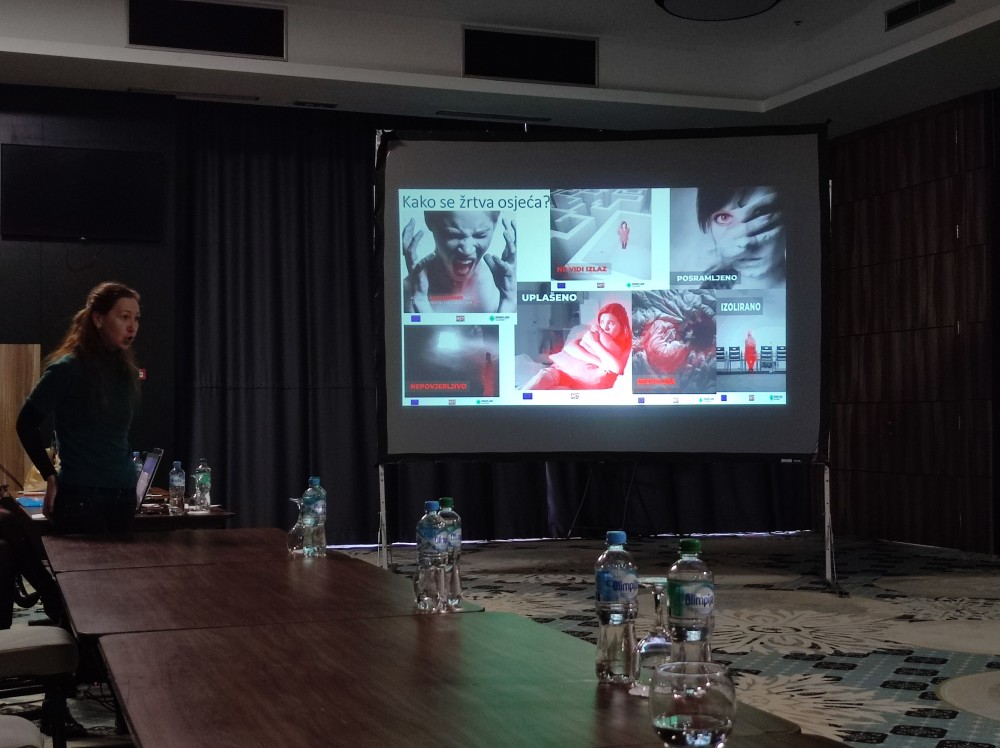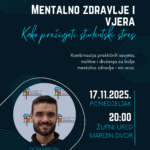Predstavnica Nadbiskupijskog centra za pastoral mladih Ivan Pavao II, Lorena Trupiano je 14. i 15. prosinca sudjelovala na edukaciji za organizacije civilnog društva koju sufinancira Europska unija u okviru projekta „Glas organizacija civilnog društva u borbi protiv trgovine ljudima“ u organizaciji Međunarodnog foruma solidarnosti - Emmaus i Astre (Anti Trafficking Action). Cilj ove dvodnevne edukacije, …

Predstavnica Nadbiskupijskog centra za pastoral mladih Ivan Pavao II, Lorena Trupiano je 14. i 15. prosinca sudjelovala na edukaciji za organizacije civilnog društva koju sufinancira Europska unija u okviru projekta „Glas organizacija civilnog društva u borbi protiv trgovine ljudima“ u organizaciji Međunarodnog foruma solidarnosti – Emmaus i Astre (Anti Trafficking Action).
Cilj ove dvodnevne edukacije, čiji su sudionici uglavnom bili socijalni radnici, policajci, studenti kriminalistike i operateri prihvatnih objekata za migrante, bio je unapređenje identifikacije žrtava trgovine ljudima i onih u opasnosti, posebice marginaliziranih skupina kao što su djeca koja žive i rade na ulici i djeca migranti bez pratnje, svi akteri koji bi se lako mogli naći u situaciji izolacije i ranjivosti. Konkretnije, prvi dio edukacije odnosio se na definiranje i razumijevanje pojma žrtve trgovine ljudima i ranjivih kategorija te upoznavanje s osnovnim načelima za minimalne standarde zaštite. Drugi dan je posvećen akcijama koje treba poduzeti u slučaju potencijalnog slučaja trgovine ljudima: definiranju individualnog plana zaštite, upravljanju psihosocijalnim posljedicama i multisektorskoj suradnji između različitih aktera uključenih u postupak. Svi ovi aspekti obrađeni su kroz predavanja, prezentacije, debate i studije slučaja u kojima se od sudionika, podijeljenih u grupe, tražilo da prodiskutiraju i riješe određeni slučaj, a zatim podijele moguća rješenja problema s ostatkom grupe.
Dostupnost predavača da odgovore na svaki zahtjev za pojašnjenjem i dubinskom analizom te općenito govoreći, neformalno, ali profesionalno okruženje u kojem se sve to odvijalo, omogućili su nam korisno i ugodno iskustvo treninga.
English version
On 14th and 15th December, members of the centre took part to a workshop for civil society organizations co-financed by the European Union within the project “Voice of civil society organizations in the fight against human trafficking”, organized by the International Solidarity Forum- Emmaus in collaboration with Astra (Anti Trafficking Action). The goal of these two-days training, whose participants were mainly social workers, police officers, criminology students and operators of reception facilities for migrants, was the improvement of the identification of victims of human trafficking and those at risk, especially the marginalized groups such as children living and working in the streets and unaccompanied migrant children, all actors that could easily find themselves in a situation of isolation and vulnerability. More specifically, the first part of the training regarded essentially the definition and understanding of the concept of victim of human trafficking and vulnerable categories, and the introduction to basic principles for minimal standards of protection. The second day has been dedicated, instead, to the action to be taken in the event of a potential case of human trafficking: the definition of an individual protection plan, the management of psychosocial consequences, and the multisectoral cooperation among the various actors involved in the process. All these aspects have been addressed through lectures, presentations, debates and case studies in which the participants, divided into groups, were asked to discuss and solve a specific case, and then share the possible solutions to the issue with the rest of the class. The availability of the moderators to welcome every request for clarification and in-depth analysis and, generally speaking, the informal but professional environment in which it all took place, provided us with a useful and enjoyable training experience.
Lorena Trupiano



